Have you ever wondered whether your cat has a sixth sense regarding your ability to sleep? Maybe you’ve had the unsettling experience of waking up to discover your cat looking at you, or maybe you’ve caught your feline companion curled up next to you while you fell asleep.
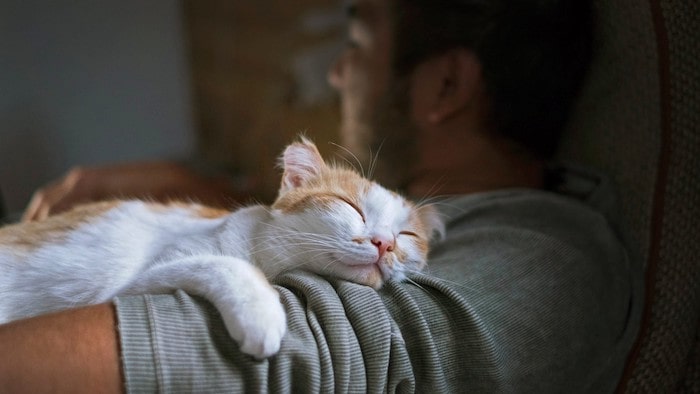
Cat owners frequently inquire if their feline companions are aware of their sleeping hours. In this article, we dig into the intriguing realm of feline behaviour and consider if our cats are able to notice and react to our sleeping habits.
So, if you’re curious to uncover the truth behind this intriguing phenomenon, join us as we unravel the mysteries of cat psychology and dive into the realm of feline intuition.
Do Cats Understand The Concept Of Sleep?
Is there a comparable idea of sleep between cats and people? This is the first issue we need to tackle. Do they realise that sleep is an essential biological process that aids in our ability to recover our lost energy and health? Do they understand how important sleep is for our mood, memory, and cognitive functioning? Do they understand the different cycles and phases of sleep?
Unfortunately, there is no conclusive response to these queries because neither assertion is supported by scientific research. According to some specialists, cats do comprehend the meaning of sleep and share the same sleep architecture as people, including phases of light sleep, deep sleep, and REM sleep. They also imply that cats, like people, may dream and have nightmares.
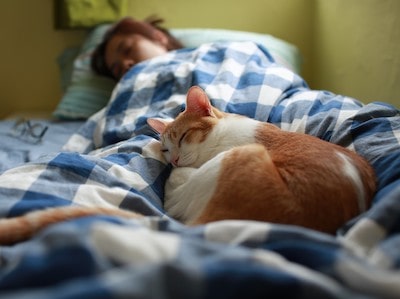
Other experts argue that cats don’t understand the concept of sleep, and that they simply sleep when they feel like it, regardless of the time of day or night. They claim that cats don’t have a circadian rhythm, which is the internal clock that regulates our sleep-wake cycle. They also doubt that cats can experience complex emotions and thoughts during their sleep.
Ultimately, it is up to each individual to decide what they believe about their cat’s understanding of sleep. There are a variety of opinions on this topic, and each one has its own merits and drawbacks. What matters most is how you and your cat interact with each other during your sleeping hours.
How Do Cats Know We’re Asleep?
Assuming that cats do have some awareness of when we’re sleeping, how do they actually know that we’re asleep? How can they tell the difference between our sleeping and waking states? The answer lies in their amazing senses.
Cats have much better hearing than humans, and they can pick up on the slightest changes in our breathing patterns. If you’re asleep, your breathing will be much slower and deeper than when you’re awake. This is a dead giveaway to your kitty that you’re in slumberland.
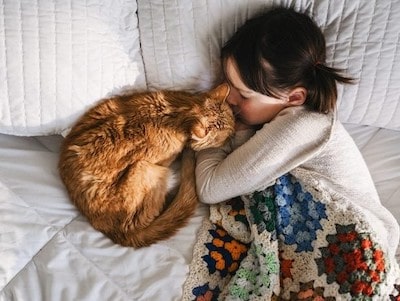
Cats can also tell when we’re asleep by our body language. When we’re asleep, our bodies are usually more relaxed and still than when we’re awake. We may also change our posture and position throughout the night. Cats can sense these subtle movements and know when we’re in a deep or light sleep.
Finally, cats can tell when we’re asleep by the way we smell. When we’re asleep, our bodies produce a different scent than when we’re awake. This is due to the changes in our hormones, metabolism, and temperature during our sleep cycle. Cats are very sensitive to smells and can easily tell the difference between the scent of a sleeping human and an awake human.
So, next time you’re wondering how your cat knows you’re asleep, just remember that they’re paying close attention to your breathing, body language, and scent.
Do Cats Care That We’re Asleep?
Now that we know how cats know we’re asleep, the next question is whether they care that we’re asleep. Do they respect our sleep or try to wake us up for their own reasons? The answer depends on the individual cat and their personality.
Some cats are very considerate of their human’s sleep and will try not to disturb them. They may cuddle with them quietly or find another spot to nap until their human wakes up. They may also adjust their own sleep schedule to match their human’s, so that they can spend more time with them when they’re awake.
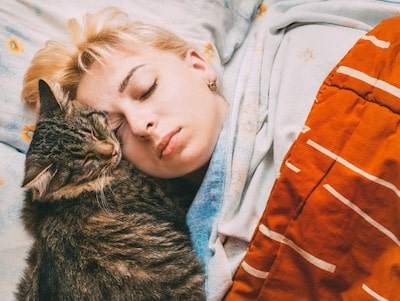
Other cats are not so considerate and will try to wake their human up whenever they feel like it. They may want attention, food, playtime, or just company. They may use various tactics to get their human’s attention, such as meowing loudly, scratching the door or furniture, knocking things over, or jumping on their face.
The reason why some cats are more respectful of their human’s sleep than others may have to do with several factors, such as their age, breed, temperament, environment, and relationship with their human. Some cats are naturally more active and vocal than others, while some cats may have learned to associate their human’s sleeping hours with certain rewards or punishments.
If you have a cat who tries to wake you up at night or in the morning, you may want to find out why they do it and what you can do to stop it. Sometimes it may be a simple matter of adjusting their feeding schedule or providing them with more toys and stimulation during the day. Other times it may require more patience and training to teach them to respect your boundaries.
How To Improve Your Sleep Quality With Your Cat
Whether your cat is a respectful sleeper or a rude awakener, there are some things you can do to improve your sleep quality with your cat. Here are some tips and advice on how to create a comfortable and harmonious sleeping environment for you and your cat:
- Make sure your cat has a cozy bed of their own where they can sleep comfortably. You can place it near your bed or in another room where they feel safe and secure.
- Establish a consistent bedtime routine for both you and your cat. Try to go to bed and wake up at the same time every day. This will help regulate your circadian rhythms and make it easier for you to fall asleep and stay asleep.
- Avoid feeding your cat right before bed or early in the morning. This will prevent them from associating your sleeping hours with food time and reduce their motivation to wake you up.
- Provide your cat with enough exercise and stimulation during the day. This will help them burn off excess energy and keep them entertained. A tired cat is a good cat who will sleep better at night.
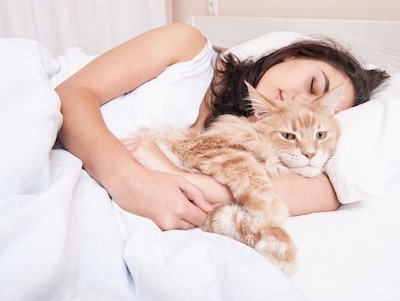
- Keep your bedroom dark, quiet, and cool at night. This will create an optimal sleeping environment for both you and your cat. You can use curtains, blinds, earplugs, fans, or air conditioners to block out any unwanted light, noise, or heat.
- Respect your cat’s preferences and personality. Some cats love sleeping with their humans while others prefer sleeping alone or with other cats. Some cats like cuddling while others like having their own space. Some cats are nocturnal while others are diurnal. Don’t force your cat to do something they don’t want to do or change their natural habits.
- Communicate with your cat clearly and calmly. If your cat tries to wake you up at night or in the morning for no good reason other than wanting attention or playtime then ignore them or gently push them away until they stop bothering you then reward them with praise or treats when they behave well.
- Be patient and consistent with your cat if you want them to change their behavior then don’t give in to their demands or reinforce their bad habits otherwise they will learn that waking you up works for them.
FAQ
Do cats have a special sense that allows them to know when I’m sleeping?
While cats don’t possess a specific sense dedicated solely to detecting when you’re sleeping, they are highly attuned to their environment and can pick up on various cues. Their acute hearing and sense of smell, combined with their ability to observe your patterns and behaviors, contribute to their awareness of your sleep habits.
Can cats sense when I’m having a nightmare or feeling unwell during sleep?
While there is no conclusive scientific evidence to prove that cats can detect nightmares or sense when you’re feeling unwell during sleep, many cat owners have reported instances where their feline companions displayed comforting behavior when they were distressed or under the weather. It is believed that cats’ sensitivity to subtle changes in body language, scent, and overall demeanor may contribute to their ability to offer support during challenging times.
Why do cats sometimes stare at me while I’m asleep?
Cats are naturally curious creatures, and their tendency to stare at you while you’re asleep could be driven by their innate instinct to observe their surroundings. They might be fascinated by your sleeping position, movements, or even the sounds you make during sleep. It’s also possible that they simply enjoy being near you and find comfort in your presence.
Conclusion
While the question of whether cats truly know when you are sleeping may remain somewhat elusive, one thing is certain: our feline companions have a remarkable ability to sense and respond to their environment, including our sleep patterns.
Whether it’s their acute senses, observational skills, or a deep connection forged through companionship, cats often display behaviors that indicate an awareness of our slumber.
As cat owners, it’s fascinating to explore the intricacies of feline behavior and the unique bond we share with our pets.
While cats may not possess a supernatural sixth sense dedicated solely to our sleep, their intuitive nature and ability to adapt to our routines make them fascinating companions in our daily lives.
So the next time you find your cat curled up beside you as you drift off to sleep, or wake up to those watchful feline eyes, take a moment to appreciate the mysterious and wonderful world of cats.
Cherish the connection you have with your feline friend, and continue to explore the depths of their behavior, for there will always be more to discover and appreciate in the enigmatic realm of our beloved cats.
